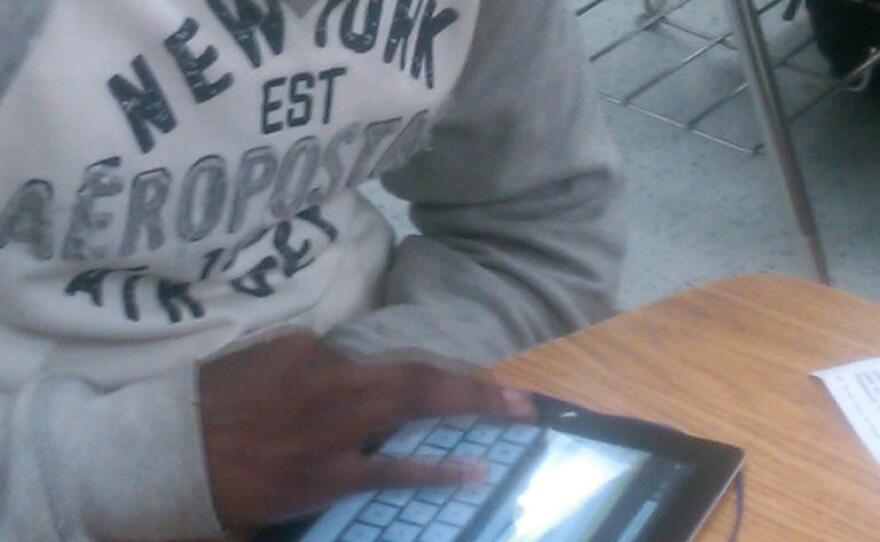In Cindy Smith’s 10th grade math class, there is no chalkboard. There isn’t even a dry-erase board. There’s a screen that connects to the internet. But, it’s turned off right now. Students sit at their desks, heads down and focused intently on the slim, black screen lit with equations, functions, and word problems i front of them. There are no pens, pencils or paper. Instead, these kids are using iPads, and they say they prefer the tech, to the textbook.
“I do because I feel that it’s going to be that way in the future, so why not go ahead and learn now,” says 10th grader Jaylen Jones.
Tallahassee’s Godby High School is the most “wired” school in the district. The iPads students are working on today, will head off to another classroom tomorrow, and these kids will once again have to pull out their hardback textbooks. There aren’t enough of the devices for each kid to get their own and each department in the school has to share. But that could soon be changing.
“I would like to see the state of Florida eliminate entirely textbook adoption. The purpose being to allow our students to have the best learning materials in the classroom," said state Board of Education member Roberto Martinez during the board's most recent meeting.
Martinez wants the state to do away with a law that requires districts to purchase new textbooks every few years. One book can cost about $100. Couple that with the four-to five classes students take a semester, and it could actually be cheaper for districts to go digital and load all the information onto one device. But it’s not the hardware that Godby High School Principal says she’s most concerned about:
“I know they’re going to make their content available online, that’s what they do. But how much are they going to charge for it?” Said Principal Shelly Bell.
She's concerned publishers may try to charge more for their software, but the state board of education even has a solution to that. It wants school districts to be able to get their learning materials anywhere they want—and even use some free stuff, like the online Khan Academy, and existing materials already used in Florida’s online school.
And it’s something that gets a thumbs-up from teachers.
“Textbooks are kind of old. I mean, how many people are buying books nowadays versus e-books, and amazon and kindle. I have a kindle. I don’t buy books anymore, so I think we are phasing it out,” said Godby High School math teacher Cindy Smith.
This is the latest in a series of moves in recent years to steer schools to more digitally-based learning methods. The state wants digital education programs in place in all schools by 2016. And Smith says she’d love that.
“So I’m hoping not be grading papers in the next few years, just get stuff sent to me electronically, I write on it, and then send it back.”
But getting there won't be easy. And the proposal could face stiff opposition from a large and powerful lobbying group-- the textbook industry. State board member Kathleen Shanahan says the board has to be prepared to fight for what it wants.
“Once we say this is our priority, we need to schedule hearings, you need to get board members in front of them who they’ve supported financially, that they know. All that stuff matters. Otherwise, all it is publishers lobbyists walking the halls everyday writing checks for as long as they can write checks, and we’re nothing to them," Shanahan said during the board's meeting.
The board of Education wants $15 billion dollars next year to fund the state's K-12 public schools and community and state colleges. $440 million of that would go toward purchasing equipment like computers, kindles and iPads. Schools would also get funding to beef up their internet capacity to actually run the software. But while many people are getting excited about going digital, others say the move presents some real logistical problems.
“With the students here, we do have issues with theft and damage to their own personal property. And so we can just imagine once you put a $500 piece of equipment in their hand, the theft is going to go up, and the damage to the actual iPad, is something we’re going to have to figure out a way to handle that, and so whether we insure it somehow, we don’t know. That’s a major issue for us,” said Ben Threadgill, the assistant principal at Godby High School.
A preliminary report from the workgroup formed to study Florida's transition to digital learning, says the state will have to purchase about a million more devices to get to a ratio of at least three students per two devices. Right now, there are more than 1600 schools that don't have wireless internet service, and 263 schools without basic broadband access.
For more news updates, follow Lynn Hatter on Twitter @HatterLynn





